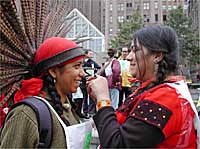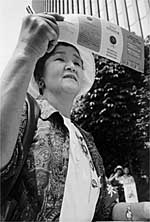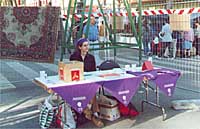|
|
april 2002 - How We Said It: Building Solidarity
 |
|
Speaking Out
The World March of Women was an extraordinary popular education movement. Thanks to information workshops on the March demands, many women increased their awareness of their situation and its relation to the larger context of economic globalization. Such sessions provided women with the occasion to express themselves.
|
Personal accounts, accounts of events, wishes, newspaper articles, songs, poems, plays, banners, paintings-all of a sudden women's voices were becoming louder.
"I'm marching because wife assault robbed me of part of my life, institutionalized violence separated me from my daughter without giving her protection, but it wasn't able to crush my willingness to fight to get rid of it," said a woman from Catalonia, Spain.
|
 Before the demonstration got started on October 17 in New York.
Before the demonstration got started on October 17 in New York.
(Photo Joane Mc Dermott)
|
|
"We came here because we think someone will hear about us and will feel our suffering. We are trying to save our people. The March gives us the feeling that we can help one another, that solidarity does exist," remarked an Iraqi refugee living in the United States and a member of the Association of Iraqi Women who was at the March on October 17, 2000.
"It is time to show women's strength, unity, solidarity and will to struggle," a Brazilian woman commented. From Perm, Russia, a poem echoed her words:
"I will not devote my strength
to melancholy and sorrow
Sadness shall not overrun my heart
Do you want to see tears well up in my eyes?
Don't count on it!"
Humble voices, timid voices, voices loud and clear, voices stifled for too long were raised in unison, never to be silenced again.
|
|

|
Copyrights
:
CC by-nc-sa 2.0
Last modified
2006-03-23 03:09 PM
This item is available in
Français,
English,
Español
|
|




 Before the demonstration got started on October 17 in New York.
Before the demonstration got started on October 17 in New York. 

